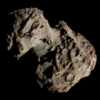43P/Wolf–Harrington
| Discovery | |
|---|---|
| Discovered by | Max Wolf @Heidelberg (024)[1] |
| Discovery date | December 22, 1924 |
| Orbital characteristics A | |
| Epoch | May 1, 2009 (JD 2454952.5) |
| Aphelion | 5.347 AU (Q) |
| Perihelion | 1.356 AU (q) |
| Semi-major axis | 3.352 AU (a) |
| Eccentricity | 0.5952 |
| Orbital period | 6.14 yr |
| Inclination | 15.98° |
| Jupiter MOID | 0.07 AU (10,000,000 km) |
| Last perihelion | August 19, 2016[2] July 1, 2010[2][3] March 17, 2004[2][3] |
| Next perihelion | 2025-Aug-04[4] |
| Year (epoch) | 2017[4] | 2020 | 2025[4] |
|---|---|---|---|
| Semi-major axis | 3.35 | 4.30 | 4.33 |
| Perihelion | 1.35 | 2.39 | 2.44 |
| Aphelion | 5.34 | 6.20 | 6.22 |
43P/Wolf–Harrington is a periodic comet discovered on December 22, 1924, by Max Wolf in Heidelberg, Germany.[1] In 2019 it passed within 0.065 AU (9,700,000 km; 6,000,000 mi) of Jupiter,[1] which lifted the perihelion point and increased the orbital period to 9 years.[5]
During the 1997 apparition the comet reached an apparent magnitude a little bit brighter than 12.[5]
The comet had an unfavorable apparition in 2010, because during perihelion (closest approach to the Sun), the comet was only 10 degrees from the Sun as seen from Earth. The comet was not more favorably positioned in the sky until mid October 2010.
The comet nucleus is estimated to be 3.6 kilometers in diameter.[1]
References[]
- ^ a b c d "JPL Small-Body Database Browser: 43P/Wolf-Harrington" (last observation: 2010-01-24). Jet Propulsion Laboratory. Retrieved 2010-03-02.
- ^ a b c Seiichi Yoshida (2009-05-30). "43P/Wolf-Harrington". Seiichi Yoshida's Comet Catalog. Retrieved 2010-03-02.
- ^ a b Syuichi Nakano (2005-10-24). "43P/Wolf-Harrington (NK 1263)". OAA Computing and Minor Planet Sections. Retrieved 2010-03-02.
- ^ a b c "43P/Wolf-Harrington Orbit". Minor Planet Center. Retrieved 2014-06-16.
- ^ a b Kronk, Gary W. "43P/Wolf-Harrington". Retrieved 2010-03-02. (Cometography Home Page)
External links[]
- Orbital simulation from JPL (Java) / Horizons Ephemeris
- Elements and Ephemeris for 43P/Wolf–Harrington – Minor Planet Center
- 43P/Wolf–Harrington at the Minor Planet Center's Database
- 43P/Wolf-Harrington (2010) – Seiichi Yoshida @ aerith.net (with pictures taken by different astronomers around the world)
- 43P/Wolf-Harrington on 2011-Apr-13 (mag 17.4N) C. Bell with a 12" (0.3-m) Schmidt-Cassegrain
Categories:
- Cometary object articles
- Periodic comets
- Numbered comets
- Comets in 2016
- Astronomical objects discovered in 1924
- Comet stubs

